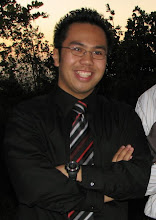 Above: With a careful eye, this overexposed picture outside my apartment shows a traditional occurrence in Florida weather, the sunny rainstorm.
Above: With a careful eye, this overexposed picture outside my apartment shows a traditional occurrence in Florida weather, the sunny rainstorm.I'LL TAKE THE
PHYSICAL CHALLENGE.
The best way to play the 1980s Nickelodeon game show, Double Dare.
MONDAY, 9:03 AM. Six medical students, and one physician assistant in training are all wearing white coats and sitting on huge beige pillowy leather sofas right outside of the doctors office. Some are waiting patiently, with their legs crossed and eyes toward the wall, while others seemingly less patient, get into the rhythm of tapping, some with their pens and others with their feet. Being this the first day, we do engage in some small talk as we wait patiently to begin our day.
A creak at the door awakens all the students out of their trances.
A doctor comes into the room, sits down on a sleekly designed roller chair and rolls around to each of us to welcome us to the clinic. After he finishes his round, he gasps, and rolls over to one of the students sitting two seats to my left, leans over and asks him:
What do YOU think you're strongest on?
OH SNAP. Usually the following concept is great: Say something you're strong at when someone asks you for your weakness. However, the opposite would be bad... Especially here, since the doctor then started popping questions out of his head one by one by one. He soon came up to me and asked me the question. It was my turn to engage in "the game." The word that involuntarily came out of my mouth was "Endocrinology." And soon I felt I was playing one of those shooting games as he was firing the questions out at me like a mad man.
Hit. Miss. Hit. Hit. Miss.
The final question he asked me had to be what he thought was the toughest one, because as he leaned over in his rolling chair to ask me it, his right eyebrow upturned, and he started to massage his chin with his right hand. He stared at me like he was focused on his target and soon started to ask me about what nuclei produce the hormones released in the posterior pituitary.
It took quite an amount of effort for me to say the words "Supraoptic" and "Paraventricular," partially because this is Step 1 information that I have not looked at since my exam. I thought I'd follow the general piece of advice to go with my "gut." The words came out of my mouth one sy-lla-ble at a ti-me.
A half-smile grew soon on my face rather nervously after I said those words. A moment of silence began.
"You are an expert," he suddenly said, as he extended his hand, smiled with a gentle chuckle, and shook my hand. My simple reply was a rather nervous, "I guess I am." (To this day, I still think, "I guess I got the question right.") After seeing some patients that day, I walked out the door feeling like I had been just slapped with the stamp on my forehead that said:
"PIMPED."
---
I believe in challenges. Provided that the one giving them does them for the right reason, not being able to meet all of them shouldn't be discouraging: Mistakes give me motivation to become better. And this is the first time I've undergone the medical school teaching concept called pimping. From my understanding, pimping is getting asked a series of challenging questions on the spot revolving around a concept when in groups during clinical rotations.
I like it, it forces me to think on my toes, and because someone actually wants me to be responsible for the information, I get myself to learn it. Getting feedback and evaluation on what you know and don't know is very useful in medical education. This philosophy continues on in residency and when I become a real doctor, because it isn't the teacher who will drive me to learn; my patients are going to expect me to be responsible to have the right information so I can treat them correctly.
For more on the effectiveness of medical school pimping, check out this New York Times article from 2006.
(And just to make sure it's on the record, this week was filled with firsts, including my first Digital Rectal Examination and my first blood draw on real patients. More on this later.)


No comments:
Post a Comment